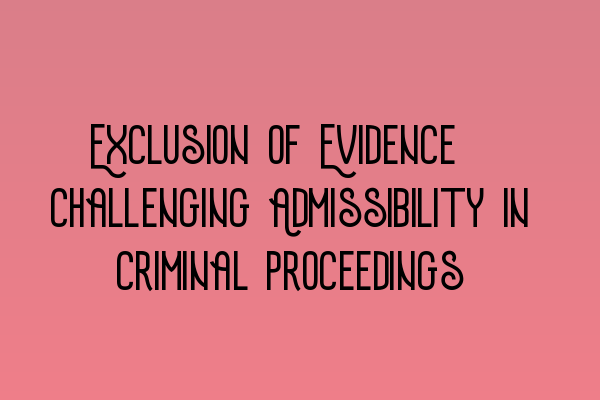Exclusion of Evidence: Challenging Admissibility in Criminal Proceedings
If you are facing criminal charges in the UK, it is essential to understand the principles and processes around the admissibility of evidence. The admissibility of evidence refers to whether or not evidence can be presented in court and considered by the judge or jury when making a decision.
In criminal proceedings, evidence plays a crucial role in determining the guilt or innocence of the accused. However, not all evidence is admissible in court. There are rules and procedures in place to ensure that evidence presented is reliable, trustworthy, and obtained in a manner that upholds the defendant’s rights. This is where the process of challenging the admissibility of evidence comes into play.
Grounds for Challenging Admissibility
There are various grounds on which the admissibility of evidence can be challenged in criminal proceedings:
- Unlawful Search and Seizure: If the evidence was obtained as a result of an unlawful search or seizure by law enforcement, it may be deemed inadmissible. This incorporates situations where the police may have violated the defendant’s rights under the Fourth Amendment of the UK Constitution.
- Coerced Confessions: Confessions that are obtained through coercion, duress, or other forms of misconduct, may be excluded as evidence. The admissibility of a confession is closely examined to determine if it was voluntary and given without any influence or pressure.
- Hearsay: Hearsay evidence, which is an out-of-court statement offered for the truth of the matter asserted, is generally considered unreliable. There are exceptions to the hearsay rule, but if the evidence falls within the general rule, it may be excluded.
It is important to consult with an experienced criminal defense solicitor who can analyze the circumstances of your case and determine if there are grounds to challenge the admissibility of certain evidence. They will have a deep understanding of the legal principles and precedents surrounding the exclusion of evidence.
The Process of Challenging Admissibility
When challenging the admissibility of evidence, your solicitor will typically follow these steps:
- Evidence Review: Your solicitor will thoroughly review the evidence that the prosecution intends to present in court. They will assess its relevance, reliability, and whether any legal issues surround its collection or use.
- Drafting Legal Motions: If there are grounds to challenge the admissibility of certain evidence, your solicitor will prepare legal motions to argue the points in court. These motions outline the legal basis for challenging the evidence and the reasons why it should be excluded.
- Oral Arguments: Your solicitor will present the legal motions during pre-trial hearings or at trial. They will make oral arguments to the judge, citing relevant laws, precedents, and case-specific factors that support their position in excluding the evidence.
- Decisions and Appeals: After considering the arguments from both sides, the judge will make a ruling on the admissibility of the evidence. If the evidence is admitted and you believe it should have been excluded, your solicitor can explore options for appealing the decision.
Challenging the admissibility of evidence requires a strong understanding of criminal law, legal procedures, and persuasive advocacy. A skilled criminal defense solicitor will employ their expertise to protect your rights and ensure a fair trial.
Conclusion
The exclusion of evidence is a vital aspect of criminal proceedings in the UK. Challenging the admissibility of evidence allows defendants to protect their rights, ensure a fair trial, and prevent unreliable or unlawfully obtained evidence from influencing the outcome of the case.
If you are facing criminal charges and believe that certain evidence should be excluded, it is crucial to seek advice from an experienced criminal defense solicitor. They will guide you through the process of challenging the admissibility of evidence and work tirelessly to protect your interests.
For more information on related legal topics, be sure to check out these articles:
- Demystifying the Solicitors Qualifying Examination Format
- LLC Formation Made Simple: Step-by-Step Guide for UK Entrepreneurs
- Business Regulations in the UK: A Comprehensive Overview
- Preparing for the SQE Exam: Strategies and Resources for Success
- SQE Workshops and Webinars: Accelerate Your Exam Preparation
